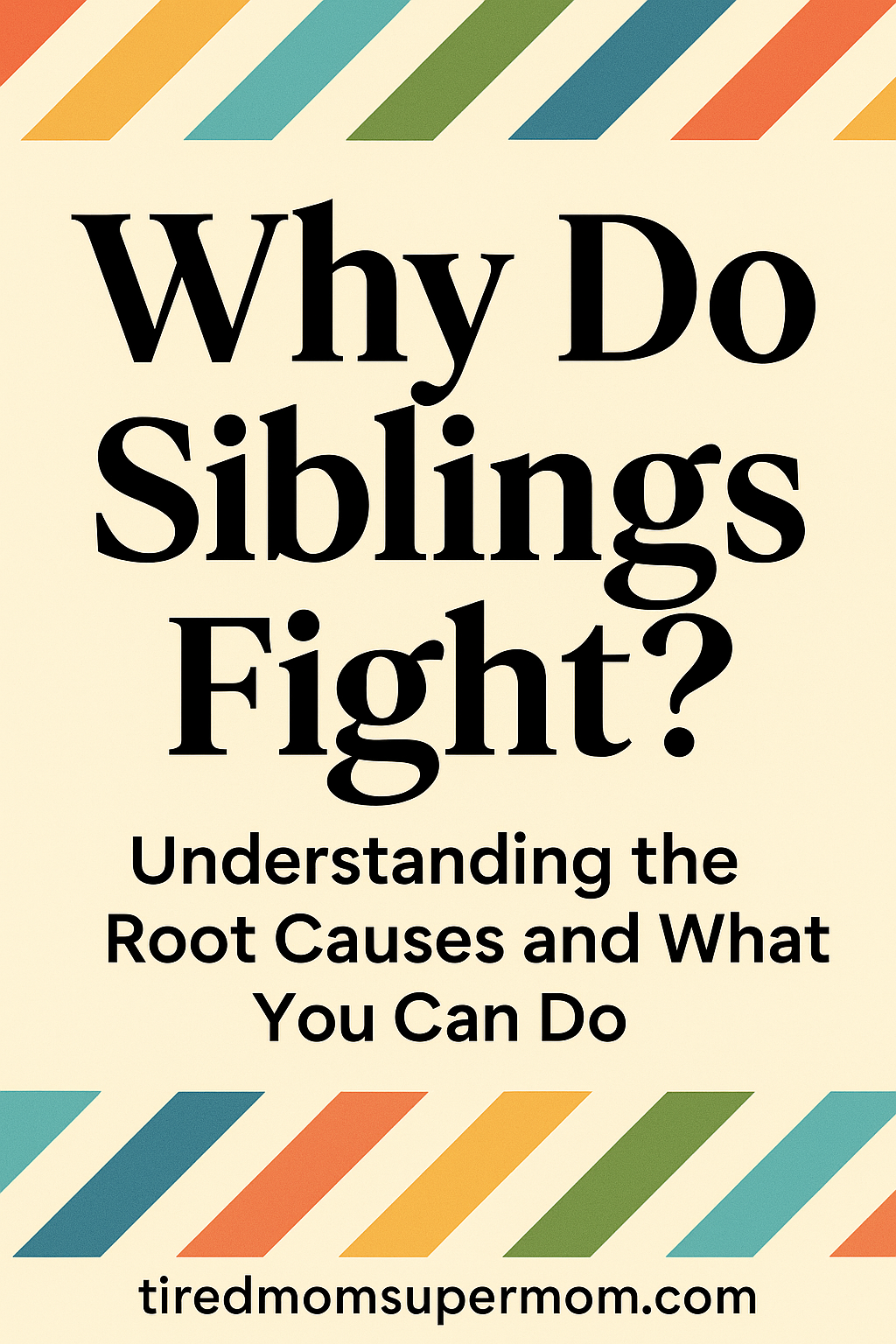Why Do Siblings Fight? Understanding the Root Causes and What You Can Do
Wondering why do siblings fight so much, even when they love each other deeply? Sibling conflicts are totally normal—but that doesn’t mean they’re easy to manage.
In this post, you’ll learn the most common causes of sibling fights and get practical tools, strategies, and product recommendations to reduce rivalry and foster family harmony.
Heads up: This post may include affiliate links. As an Amazon Associate, I earn from qualifying purchases—at no extra cost to you. Full privacy policy and disclosure here.
Why Siblings Fight: A Quick Breakdown
Sibling fights usually stem from a combination of developmental differences, unmet emotional needs, competition for parental attention, and natural personality clashes. Understanding why do siblings fight is the first step to reducing daily tension and teaching conflict resolution skills that will last a lifetime.
Here are the 10 most common reasons siblings fight — plus how to handle each one like a pro parent.
1. Competition for Attention
Kids often feel like they’re vying for your time and energy. When one child perceives that another gets more cuddles, praise, or screen time with you, resentment brews.
What to Do:
Set up one-on-one time with each child regularly—even 10 minutes of dedicated attention makes a difference. A visual timer like the Time Timer MOD helps manage turns fairly.
🧠 Try This: 50 Ways to Help Older Siblings Accept a New Baby
2. Developmental Differences
When your 8-year-old is annoyed at your toddler for knocking down their LEGO set… that’s development at play. Older kids expect more from younger siblings than they can realistically deliver.
What to Do:
Coach older kids to adjust expectations and model forgiveness. Redirect toddlers to parallel play with something engaging, like this sensory sorting toy.
🧩 Explore more: Sharing Activities for Kids
3. Lack of Conflict Resolution Skills
Sometimes, fights are less about the topic and more about not knowing how to disagree respectfully.
What to Do:
Teach simple scripts like “I feel ___ when you ___.” Use a book like “I Love My Little Brother” to introduce empathy.
📚 Want more? Here’s a list of Top Books to Tame Sibling Rivalry Fast

4. Personality Clashes
Even in adulthood, personality differences cause friction. Kids are no different. One child might be high-energy and playful, while the other craves quiet and order.
What to Do:
Acknowledge each child’s temperament. Set up zones for quiet time and active play using items like foldable play tunnels or color-coded bins.
5. Perceived Favoritism
This is one of the most common reasons parents Google “why do siblings fight?” Even when you strive to treat everyone fairly, kids might interpret things differently.
What to Do:
Avoid comparisons. Instead of saying “Why can’t you be more like your sister?” try “What’s your idea for solving this?”
6. Boredom and Lack of Structure
Unstructured time + cooped-up kids = guaranteed fighting.
What to Do:
Create a rhythm to the day. Plan some downtime and shared activities. Try joint sibling projects to channel that energy into connection instead of chaos.
🛒 Tip: Grab an age-appropriate STEM activity kit to keep their brains busy and collaborative.

7. Changes in the Family Dynamic
Moves, new schools, and even your changing work schedule can cause stress that comes out sideways in sibling arguments.
What to Do:
Maintain as much predictability as you can and validate your kids’ feelings. Use emotion flashcards or a feelings chart to help kids process change.
8. Jealousy and Insecurity
Jealousy can creep in when one sibling hits milestones faster or gets more attention for achievements.
What to Do:
Celebrate individual strengths and avoid constant praise for only academics or sports. Create a family “kindness jar” and reward moments of sibling support.
👀 Read: Handling Sibling Jealousy – A Parent’s Guide
9. Lack of Personal Space
Some kids are more sensitive to invasions of space than others. Sharing a room, toys, or even a chair can spark fights.
What to Do:
Respect boundaries. Use room dividers, storage bins with names, or color-coded systems to designate what belongs to whom.
10. Hunger, Fatigue, or Overstimulation
Kids are more likely to fight when they’re physically uncomfortable or overstimulated.
What to Do:
Offer quiet breaks, healthy snacks, and lots of water. Try calming tools like a weighted lap pad or calming music.nd harmonious sibling relationships that last a lifetime.

Real Talk: Sibling Fights Are a Normal Part of Growing Up
If you’ve been feeling overwhelmed by sibling squabbles, you’re not alone. These fights are developmentally appropriate and even healthy—when guided correctly.
By consistently modeling respectful communication, offering tools for problem-solving, and giving each child space to grow as their own person, you’re setting the stage for stronger lifelong bonds.
Tools to Reduce Sibling Fights (Parent-Approved!)
Here’s a quick toolkit of products parents love for reducing sibling tension:
- 🧠 Conflict Resolution Card Deck – Fun conversation starters
- 🎧 Noise-Canceling Headphones for Kids – Perfect for quiet-loving siblings
- 🎲 Cooperative Board Games – Encourage teamwork over rivalry
Final Thoughts: Empowering Siblings to Be Teammates
The next time you wonder why do siblings fight, remind yourself: these are moments for growth. When guided with compassion and structure, your kids can move from rivals to lifelong teammates.
Encourage connection through cooperative play, validate each child’s individuality, and model calm conflict resolution. Over time, you’ll notice more harmony—and less hollering.
✨ Want more support? Join the conversation in the comments and pin this post for later!
📌 Pin This Post for easy access!
❓ FAQ: Why Do Siblings Fight?
How can I stop my kids from fighting all the time?
You can’t eliminate sibling fights completely, but you can reduce their frequency by teaching emotional regulation, setting consistent routines, and ensuring each child feels seen and heard.
What age do sibling fights peak?
Sibling conflicts often peak between ages 4 and 10, especially when children are developing autonomy but still depend on parental attention and structure.
Are sibling fights healthy?
Yes—when managed well, sibling fights can teach kids negotiation, empathy, and emotional resilience. The key is guiding the process and stepping in before things escalate.
What books help reduce sibling rivalry?
Books like “I Love My Little Brother” and “Siblings Without Rivalry” are excellent. Check out this list of Top Books to Tame Sibling Rivalry Fast.
Is favoritism really that damaging?
Yes. Even subtle signs of favoritism can fuel resentment between siblings. Strive to honor each child’s unique strengths without comparing them to one another.

